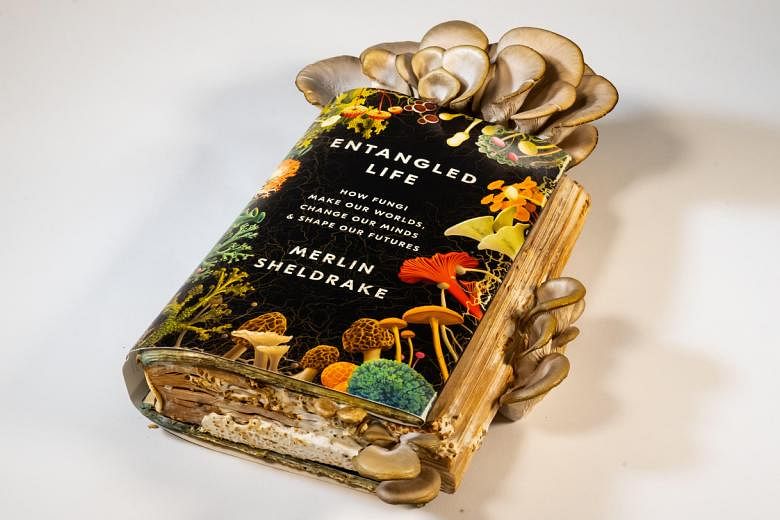Most authors do not prefer to eat their words, but British biologist Merlin Sheldrake has done so with enthusiasm.
Upon receiving a copy of his debut book, Entangled Life, he seeded its pages with Pleurotus mycelium, a kind of oyster mushroom.
He waited for the fungus to eat its way through the book, until the covers sprouted mushrooms. Then he ate them.
"It's very easy to be caught up with the ideas of how things work, to be distracted by schemas and models and simulations and forget that we're talking about a living world made of organisms with physical, warm bodies," says the 32-year-old over Skype.
"This was a way of bringing me down to earth, of grounding me in my inquiry and reminding me that these organisms live their own lives, whether or not I thought about them."
Dr Sheldrake's fascinating, often poetic book introduces readers to the weird and wonderful world of fungi.
In its pages are slime moulds that can decipher mazes and model motorway networks; lichens that survive in the harshest climates for thousands of years; and "zombie fungi" that infect ants, forcing them to climb up high, whereupon the fungus sprouts a stalk out of its host's head and showers spores down on unwitting ants below.
"If I think about mycelial growth for more than a minute," writes Dr Sheldrake, "my mind starts to stretch."
He is based in London but has spent the British pandemic lockdown isolated in the Midlands town of Newark-on-Trent for the safety of his elderly parents. He thinks he had Covid-19 at some point, though without testing he cannot be sure.
"It came on very quickly, and then I just felt completely flattened, drained of energy and it was very hard to get out of bed. Thankfully, it lasted only a day."
He is the son of parapsychologist Rupert Sheldrake and voice teacher Jill Purce, and the older brother of musician Cosmo Sheldrake, who is now turning bioelectric recordings of the sounds of fungus digesting Entangled Life into music.
As a child, Dr Merlin Sheldrake would dive into leaf piles and observe their decomposition. As a teenager, he grew mushrooms in his bedroom.
As a plant sciences undergraduate at Cambridge University, he became fascinated with symbiosis. "In thinking about symbiosis, it's very hard not to think about fungi because fungi play such a big part in so many of the blockbuster symbioses of the planet," he says.
Throughout his book, Dr Sheldrake seems to be constantly physically immersing himself in fungi or ingesting them.
He buries himself naked in a mound of decomposing wood chips. He harvests apples from scientist Isaac Newton's tree and presses them into a cider he calls "Gravity", which he then drinks. He swallows LSD as part of a clinical study and tries to work through scientific problems while high in a hospital bed.
"Fungi have the power to confuse many of the categories and systems that we use to organise our lives and our experiences," he says.
"It can be confusing. It can be scary when those categories start to break down, because it represents a kind of instability or loss of control. I try in the book to find ways to take comfort in uncertainty, to keep people feeling comfortable in the space created by open questions."
Part of the book looks at fungal solutions to environmental problems, from the white rot fungi that can grow on a diet of used diapers to Ecovative, a company that creates products such as packaging, leather and even furniture out of mycelium.
Fungi make worlds and unmake them, says Dr Sheldrake. "They live their lives entangled with their surroundings as these mycelial networks, and they're a good reminder that we all live our lives entangled with our environments. Our environments are themselves made up of organisms entangled with their environment.
"It's by forgetting this, or not paying enough attention to this, that we're able to justify destructive behaviour to other humans and to the environment - the tangle of climate breakdown, environmental degradation, mass extinction and social injustice.
"To admit that we live our lives entangled with organisms that we share the planet with is a big part in our coming to terms with the situation we're in, and to look for ways out of it."
• Entangled Life ($49.13) is available at Kinokuniya's website.


